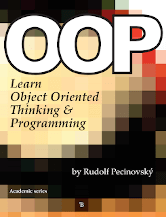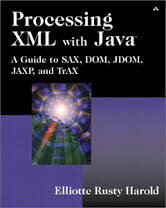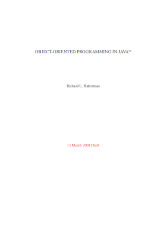Last Updated on September 19, 2024
10. Object Oriented Programming using Java by Rudolf Pecinovsk
 The whole textbook is designed as a record of the dialogue of the author with his daughter who wants to learn programming.
The whole textbook is designed as a record of the dialogue of the author with his daughter who wants to learn programming.
The author endeavors not to explain the Java programming language to the readers, but to teach them real programming. To teach them how to think and design the program as the experienced programmers do.
Entire matter is explained in a very illustrative way which means even a current secondary school student can understand it quite simply
11. Processing XML with Java by Elliotte Rusty Harold
 Processing XML with Java is a complete tutorial about writing Java programs that read and write XML documents.
Processing XML with Java is a complete tutorial about writing Java programs that read and write XML documents.
It contains over 1000 pages of detailed information on SAX, DOM, JDOM, JAXP, TrAX, XPath, XSLT, SOAP, and lots of other juicy acronyms. This book is written for Java programmers who want to learn how to read and write XML documents from their code.
12. Object-oriented Programming in Java Textbook by Richard L. Halterman

This book provides step-by-step lessons that cover OOP (object-oriented programming) and the Java language comprehensively with clear examples, code, and figures. You’ll use Java’s built-in objects to create applets. Design your own classes and assemble them into sophisticated, complete programs that run inside an HTML browser or as stand-alone applications. Create objects using the simple ideas of sequence, selection, and iteration. You’ll delve into Java’s Abstract Window Toolkit (AWT) to create full-color, multimedia Java applets, components, and containers. Explore Java’s versatile input/output streams and utility classes. Master using threads and networking to create Web-capable client/server programs.
It is aimed at students with little or no programming experience, and it uses DrJava as a vehicle for student experimentation object-oriented programming concepts.
Object-oriented Programming in Java is available under a Creative Commons license.
Next page: Page 5 – Java Structures and more books
Pages in this article:
Page 1 – Introduction to Programming Using Java and more books
Page 2 – Java Application Development on Linux and more books
Page 3 – Java Programming for Kids and more books
Page 4 – Object Oriented Programming using Java and more books
Page 5 – Java Structures and more books
All books in this series:
| Free Programming Books | |
|---|---|
| Ada | ALGOL-like programming language, extended from Pascal and other languages |
| Agda | Dependently typed functional language based on intuitionistic Type Theory |
| Arduino | Inexpensive, flexible, open source microcontroller platform |
| Assembly | As close to writing machine code without writing in pure hexadecimal |
| Awk | Versatile language designed for pattern scanning and processing language |
| Bash | Shell and command language; popular both as a shell and a scripting language |
| BASIC | Beginner’s All-purpose Symbolic Instruction Code |
| C | General-purpose, procedural, portable, high-level language |
| C++ | General-purpose, portable, free-form, multi-paradigm language |
| C# | Combines the power and flexibility of C++ with the simplicity of Visual Basic |
| Clojure | Dialect of the Lisp programming language |
| ClojureScript | Compiler for Clojure that targets JavaScript |
| COBOL | Common Business-Oriented Language |
| CoffeeScript | Transcompiles into JavaScript inspired by Ruby, Python and Haskell |
| Coq | Dependently typed language similar to Agda, Idris, F* and others |
| Crystal | General-purpose, concurrent, multi-paradigm, object-oriented language |
| CSS | CSS (Cascading Style Sheets) specifies a web page’s appearance |
| D | General-purpose systems programming language with a C-like syntax |
| Dart | Client-optimized language for fast apps on multiple platforms |
| Dylan | Multi-paradigm language supporting functional and object-oriented coding |
| ECMAScript | Best known as the language embedded in web browsers |
| Eiffel | Object-oriented language designed by Bertrand Meyer |
| Elixir | Relatively new functional language running on the Erlang virtual machine |
| Erlang | General-purpose, concurrent, declarative, functional language |
| F# | Uses functional, imperative, and object-oriented programming methods |
| Factor | Dynamic stack-based programming language |
| Forth | Imperative stack-based programming language |
| Fortran | The first high-level language, using the first compiler |
| Go | Compiled, statically typed programming language |
| Groovy | Powerful, optionally typed and dynamic language |
| Haskell | Standardized, general-purpose, polymorphically, statically typed language |
| HTML | HyperText Markup Language |
| Icon | Wide variety of features for processing and presenting symbolic data |
| J | Array programming language based primarily on APL |
| Java | General-purpose, concurrent, class-based, object-oriented, high-level language |
| JavaScript | Interpreted, prototype-based, scripting language |
| Julia | High-level, high-performance language for technical computing |
| Kotlin | More modern version of Java |
| LabVIEW | Designed to enable domain experts to build power systems quickly |
| LaTeX | Professional document preparation system and document markup language |
| Lisp | Unique features - excellent to study programming constructs |
| Logo | Dialect of Lisp that features interactivity, modularity, extensibility |
| Lua | Designed as an embeddable scripting language |
| Markdown | Plain text formatting syntax designed to be easy-to-read and easy-to-write |
| Objective-C | Object-oriented language that adds Smalltalk-style messaging to C |
| OCaml | The main implementation of the Caml language |
| Pascal | Imperative and procedural language designed in the late 1960s |
| Perl | High-level, general-purpose, interpreted, scripting, dynamic language |
| PHP | PHP has been at the helm of the web for many years |
| PostScript | Interpreted, stack-based and Turing complete language |
| Prolog | A general purpose, declarative, logic programming language |
| PureScript | Small strongly, statically typed language compiling to JavaScript |
| Python | General-purpose, structured, powerful language |
| QML | Hierarchical declarative language for user interface layout - JSON-like syntax |
| R | De facto standard among statisticians and data analysts |
| Racket | General-purpose, object-oriented, multi-paradigm, functional language |
| Raku | Member of the Perl family of programming languages |
| Ruby | General purpose, scripting, structured, flexible, fully object-oriented language |
| Rust | Ideal for systems, embedded, and other performance critical code |
| Scala | Modern, object-functional, multi-paradigm, Java-based language |
| Scheme | A general-purpose, functional language descended from Lisp and Algol |
| Scratch | Visual programming language designed for 8-16 year-old children |
| SQL | Access and manipulate data held in a relational database management system |
| Standard ML | General-purpose functional language characterized as "Lisp with types" |
| Swift | Powerful and intuitive general-purpose programming language |
| Tcl | Dynamic language based on concepts of Lisp, C, and Unix shells |
| TeX | Markup and programming language - create professional quality typeset text |
| TypeScript | Strict syntactical superset of JavaScript adding optional static typing |
| Vala | Object-oriented language, syntactically similar to C# |
| VHDL | Hardware description language used in electronic design automation |
| VimL | Powerful scripting language of the Vim editor |
| XML | Rules for defining semantic tags describing structure ad meaning |
